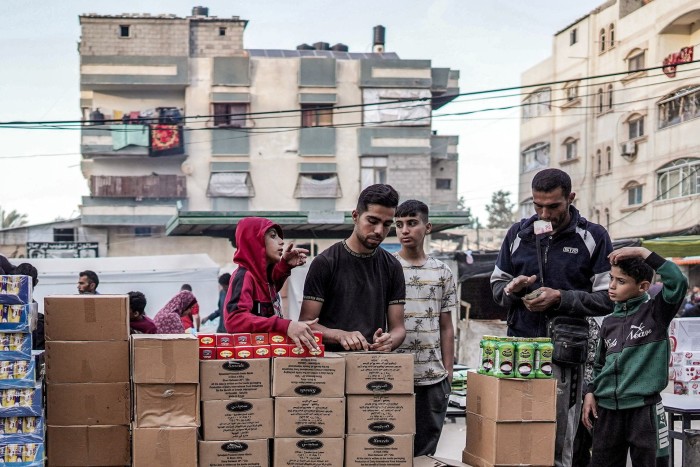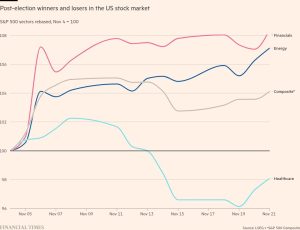Profiteers take over Gaza food trade as UN aid falters

Private traders have pushed into the security void in Gaza, providing more food and basic goods than the UN but leaving Palestinians exposed to profiteering and spiralling prices.
The share of aid flow from private operators, who have been more able to navigate the dangers of the war-torn enclave, has increased from 5 per cent in April to about 60 per cent in August and September, according to Israeli military data.
But traders are paying hefty black market fees for Israeli-issued import permits to gain access to Gaza, as well as significant sums for armed “security companies”. Aid workers and traders in Gaza say the costs, plus sizeable mark-ups, are then passed on to destitute Palestinians in the enclave, where hunger and food shortages are rife.
“Each middleman takes his cut along the way, and a few people are making a lot of money,” said one Palestinian trader. “It’s all at the expense of the consumer. Even when there’s food, people can’t buy it.”

Traders provide fresh produce, complementing the bulk dry and canned goods from aid agencies, but many businessmen also ship non-essential goods such as potato chips. Israel classifies all such commercial goods as humanitarian aid. The total food “aid” entering Gaza last month reached its lowest point since February, according to Israeli military data.
“Private sector goods are not aid,” said Sam Rose, director of planning at UNRWA, the UN agency for Palestinians. “In an environment where people have nothing, what’s coming in is not necessarily corresponding to their needs, it’s what the market is able to provide.”
Private operators brought nearly twice as many trucks into Gaza as the humanitarian sector between May 6 and July 31, according to the Gaza Chamber of Commerce. A network of traders between Cairo, the West Bank, Israel and Gaza co-ordinates the entry of trucks via the southern Kerem Shalom crossing to Israel directly with the military.
The UN and NGOs have been increasingly deterred by lawlessness and active combat along the delivery routes, according to two UN officials based in Gaza. The situation became more perilous after Israel’s Rafah operation closed the key crossing with Egypt; the number of trucks delivering aid from humanitarian organisations declined by more than two-thirds between April and September, reaching the lowest point since the war began, according to the UN.
The Financial Times spoke with more than a dozen people about the private takeover of food supply into Gaza, including traders, industry groups, local officials and aid workers.
One Palestinian trader described how the exorbitant black-market costs of buying import permits from middlemen and hiring armed protection had slimmed his margins and forced him to raise prices in Gaza.
To import one truck from the West Bank to Gaza, the trader pays between $5,000 and $35,000 for a permit on the secondary market, depending on the value of the goods; $3,000 to guard the truck inside Gaza; and a minimum of $4,000 in transport fees. Before the war, the sole cost was $300 in transport fees.

Between November and May, Israeli authorities allowed just five Palestinian companies to obtain permits to bring goods into Gaza, giving them a stranglehold over the market. These groups then began selling the permits to other traders, according to three Gazan traders and the head of Gaza’s Chamber of Commerce.
Israel has given more traders access to permits since April. But these remain concentrated in the hands of a few traders, according to insiders. It is unclear on what basis Israel grants the permits.
“There are some traders who will apply for a permit two, three, even 10 times and will never get approval. Meanwhile, another trader might apply for 10 permits and have all of them approved. That person controls the market . . . and can sell permits,” said Mohammad Barbakh, a researcher at the Palestinian economy ministry in Gaza.
The Israeli military body responsible for humanitarian affairs in Gaza, known as Cogat, said “numerous merchants are permitted to deliver aid, contingent upon a thorough and up-to-date security screening conducted by the security forces”.
Two-thirds of the commercial deliveries originate from Israel and the remainder from the West Bank, according to chamber of commerce data from July.
One trader said that importing a truck of luxury items such as coffee and spices now cost more than $40,000. Cash shortages and widespread unemployment mean even the small amount of food that reaches Gaza is unaffordable to many.
The already impoverished strip has been under Israeli siege since shortly after Hamas’s October 7 attack on Israel triggered the war, while intense bombardments have reduced many of its buildings to rubble and displaced most of the more than 2mn residents within the enclave.
Abu Shukri, who works for a mutual aid initiative in central Gaza, said he could no longer afford to buy fresh food for his neighbours. By July, the price of fresh vegetables in Gaza had increased 170 per cent from the start of the war, while fresh fruit prices had risen 228 per cent, according to the World Food Programme (WFP).
The price of 1kg of tomatoes in Khan Younis in central Gaza had risen almost fivefold, it said. Palestinians must now pay 35 shekels ($9.17) a kilo for tomatoes there, said Barbakh. Costs are further spiralling as traders stockpile in anticipation of crossings being closed over a series of Jewish holidays in October.
A Gazan trader who once imported from Dubai and India said he had scaled his shipments down to a fraction of their level in May because Palestinians could not buy what he was selling: “The market is full, but people have no purchasing power.”

In Gaza City, the price of a kilo of tomatoes has increased by more than 8,690 per cent, while the price for 2kg of eggs is up by 1,829 per cent, according to the WFP. The even steeper rises have taken place because Israel does not allow traders to bring goods across the checkpoints separating south from north.
That has resulted in even worse hunger conditions in northern Gaza, where Palestinians survive on flour and cans from aid trucks and small amounts of commercial goods smuggled from the south.
Faisal Al-Shawa, a prominent Palestinian trader, pointed to other wartime hazards: “The risks for traders are that the goods get bombed, or they spoil because of bad storage, or that the price plummets because there is a lot of supply of some items like instant coffee.”
Theft, fostered by lawlessness and desperation, is also a major risk for traders. Most engage “security companies” — armed groups of up to 20 Gazans, some carrying bats and others guns — to guard their trucks. “You have no choice but to hire protection,” said another importer from Gaza who now operates out of Cairo. “This is what’s driving up our costs.”
The UN does not hire armed protection and remains vulnerable to looting, especially as the widespread smuggling of cigarettes — forbidden by Israel — in aid trucks makes them appealing targets.
“The commercial sector uses armed guards and they’re essentially paying protection money to the families to leave them alone. We won’t do that: we won’t use armed guards,” said Scott Anderson, deputy humanitarian co-ordinator and director of UNRWA affairs in Gaza.
“The minute there are guys with [Kalashnikovs] on your truck, you’re a target for Israel,” added Sam Rose of UNRWA.
Additional reporting by Heba Saleh in Cairo
Data visualisation by Aditi Bhandari
#Profiteers #Gaza #food #trade #aid #falters








